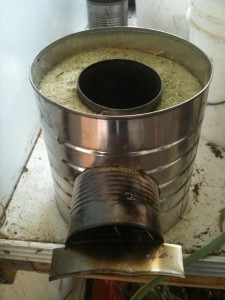This is the second of two posts covering Taylor Bye’s activities at the Shell Eco Marathon, a vehicle fuel mileage competition held in Houston this past April 5-7. Bye, a member with NCAT is San Antonio, spent part of his time shadowing a local high school team competing at the event.
At the Eco Marathon, cars fall into 2 categories; Prototype and UrbanConcept. Cars also compete within different fuel classes that include gasoline, petroleum diesel, FAME (Fatty Acid Methyl Ester, a.k.a. biodiesel), E-100 ethanol (100% ethanol), battery electric, and hydrogen fuel cells. Each car receives a measured amount of fuel (or electrical charge), then does 10 laps around a 0.6 mile track laid out on the streets surrounding Discovery Green Park.
After the run is over, the fuel (or battery capacity) is measured again, yielding a number that can be extrapolated into a miles-per-gallon figure. The cars are light weight, with the maximum weights (exclusive of driver) set at 308 lbs and 451 lbs for Prototype and UrbanConcept respectively. The Prototype designs focus on low profiles and slippery shapes. A 3-wheeled configuration and prone or reclined driving positions are de rigueur for Prototypes. The UrbanConcept vehicles are meant to be closer to a modern, functional automobile. They featured 4 wheels, upright seating positions, fully functional windshield wipers, and working headlights, taillights, and turn signals.
I wasn’t there to cover the petroleum fuel categories. My interest was in alternative fuels, particularly ethanol. That said, Laval University from Quebec, Canada deserves mention because they achieved over 3587 mpg in their prototype class entry. That’s no typo. The team from Laval ran away with the overall title, but several gasoline teams exceeded 1000 mpg as well. Alden-Conger High School from Minnesota was the strongest performer in the Ethanol category, with their prototype-class, Honda powered car turning in a best of 1579.9 mpg, closely followed by Mater Die High School at 1416.2. In UrbanConcept, 2 teams achieved results with biodiesel powered UrbanConcept cars, with figures of 88.5 and 119.9 mpg.
When I was able to question the teams who were running ethanol or biodiesel, one of the topics I tried to get them to discuss is what sorts of modifications they made to their engines. The answers showed that, as I suspected, there is a range. Fuel delivery systems were frequently modified, but some things that are frequently recommended for making fuel conversions are things they just can’t or don’t do. For example, they haven’t machined the cylinder heads or engine block to increase compression ratio, a common recommendation for converting to ethanol. To me, and I know I’m simplifying things, this indicates that doing these conversions might not be as difficult as it is sometimes made out to be. It also confirms the importance of weight in fuel mileage. Anyone wondering why across-the-board fuel economy has barely increased in the United States since the 1980s needs only to look at the corresponding weight gain. Yes, engines are far more efficient, but they have to haul along more weight, which wipes out the gains in technology. At the moment, my opinion is that until cars get substantially lighter, 50 mpg is going to be the purview only of expensive and resource intensive hybrids. Fortunately, Shell has developed a fantastic event where some of the best young minds in the country can showcase their ability to contribute solutions.
 Taylor is the first Energy Corps member to serve to NCAT’S San Antonio office. His duties revolve around helping the city of San Antonio become a “greener” city. He received my B.A. with a Major in American History from Dickinson College in May 2012. Taylor is an experienced blogger and in the summer 2011 interned at the Susan B. Anthony Birthplace Museum in Adams, MA, where he researched and wrote articles for the museum newsletter.
Taylor is the first Energy Corps member to serve to NCAT’S San Antonio office. His duties revolve around helping the city of San Antonio become a “greener” city. He received my B.A. with a Major in American History from Dickinson College in May 2012. Taylor is an experienced blogger and in the summer 2011 interned at the Susan B. Anthony Birthplace Museum in Adams, MA, where he researched and wrote articles for the museum newsletter.












